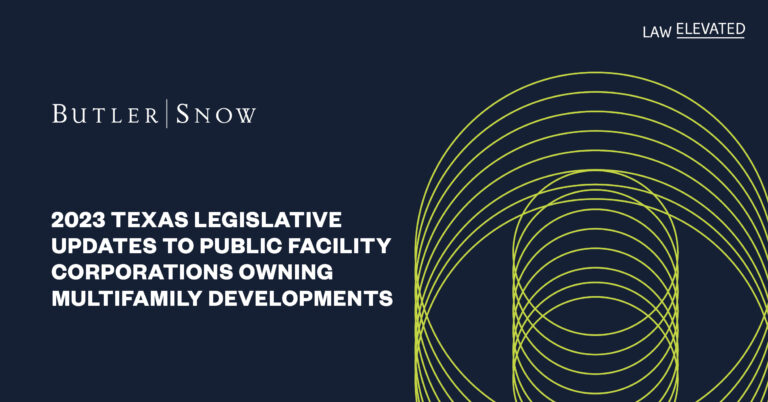During the 88th Regular Session, the Texas Legislature passed HB 2071 to address the perceived misuse of property tax incentives used by Public Facility Corporations (PFCs). The legislation significantly updated Texas Local Government Code Chapter 303 and the way public facility corporations own and operate multifamily residential developments. HB 2071 revises the requirements that must be met for a multifamily residential development, approved by a public facility corporation, to receive a property tax exemption.
HB 2071 Summary of New Provisions – Public Facility Corporations:
Under Chapter 303 of the Texas Local Government Code, a public facility corporation is a nonprofit corporation that can be created by sponsoring entity including a municipality, county, school district, housing authority, or special district. Sponsoring entities utilize the PFC structure to acquire, construct, rehabilitate and operate a public facility, commonly an affordable housing development. The PFC tool allows private developers to receive property tax exemptions in exchange for providing affordable housing units.
HB 2071:
HB 2071 was filed in response to concerns about facility owners offering 100% property tax abatements for developments providing inadequate affordable housing options and, in some cases, entering into agreements outside of an authorized jurisdiction. HB 2071 addresses these issues by imposing additional eligibility requirements that must be met for a multifamily housing development to receive a property tax exemption.
The legislative changes made to Chapter 303 and Chapter 392 of the Local Government Code do not apply to PFC-owned multifamily residential developments that: 1. have at least 20% of their residential units reserved for public housing units; 2. participate in the Rental Assistance Demonstration Program; 3. receive financial assistance from a tax-exempt bond; or 4. receive financial assistance from the Low Income Housing Tax Credit Program.
Some of the New Provisions under HB 2071 require:
- A multifamily development owned by a PFC to be located inside sponsor’s area of operation (housing authority) or inside the sponsor’s boundaries (non-housing authority)
- A PFC to hold a public hearing approving the multifamily residential development
- A PFC to reserve a portion of the available units to lower income and moderate-income housing units
- Taxation and exemption requirements, and/or applicable income restrictions, be documented in a LURA (10-year compliance period)
- A PFC to submit an annual audit report for a compliance audit to TDHCA and to the chief appraiser of the applicable appraisal district. Audit must be conducted by independent auditor/compliance expert to determine compliance with tax exemption requirements.
- Tenant protections that prevent a PFC from refusing to rent a residential unit to an individual/family because they participate in the housing voucher program.
- All PFCs receiving an ad valorem tax exemption under Chapter 303, regardless of when approved or acquired by the PFC, must comply with the audit requirement.
The Bill became effective on June 18, 2023.
HB 2071 imposes additional restrictions for PFCs to qualify for tax exemptions and provides oversight to ensure that PFCs comply with these provisions.
The Texas Regulatory & Government Practice Group provides consulting, advisory and advocacy services related to real estate development and the use of economic development incentives for affordable housing providers. Our team has experience representing national developers, syndicators, REITs and development management companies. We are here to help. Please reach out with questions related to HB 2071, public facility corporations or other tax incentives.
